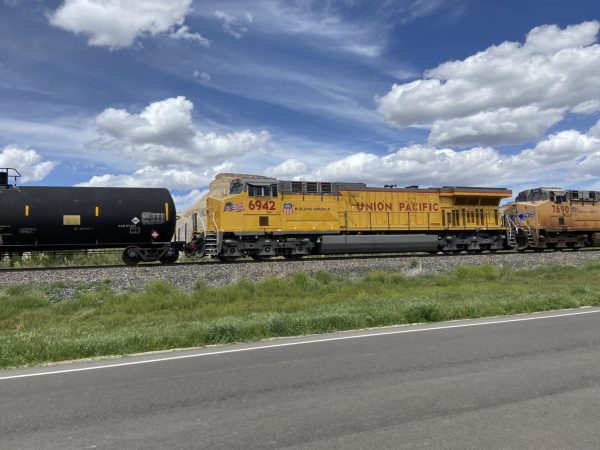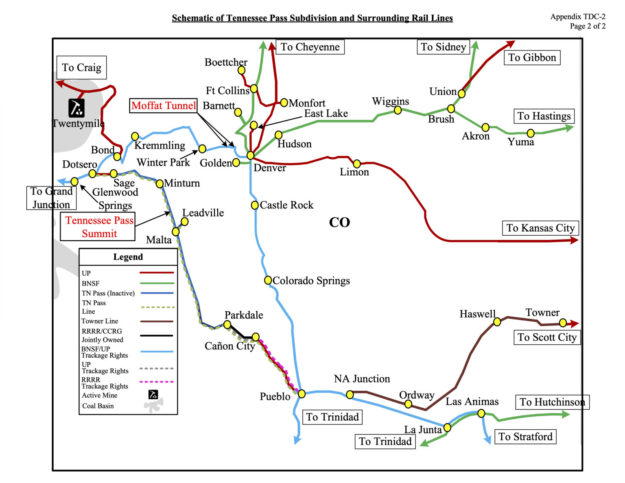Billionaire who kicked off a railroad war says he’s no longer interested in dormant line over Colorado Rockies

MINTURN, Colo. — A billionaire New York developer and Colorado agricultural landowner who launched a full-blown railroad war in his pursuit of Union Pacific’s dormant Tennessee Pass rail line from Pueblo to Eagle County is no longer trying to acquire any part of the approximately 200-mile stretch of tracks.
“Mr. Soloviev has no further interest in purchasing the Tennessee Pass Line; he has instead purchased the San Luis Valley Line,” Colorado Pacific Railroad’s general counsel William Osborn said of Stefan Soloviev, chairman of the Soloviev Group and Crossroads Agriculture — the 26th largest landowner in the U.S. with farming, ranching, and renewable energy in Colorado, New Mexico and Kansas. Crossroads has an estimated 400,000 acres of farmland in production.
Asked if this means Soloviev is no longer pursuing an east-to-west rail connection to move his grain to West Coast ports for transport to Asia, thereby breaking up Union Pacific’s “monopoly stranglehold” on freight transport through Colorado, Osborn said, “I can’t comment on that.”
Soloviev’s Colorado Pacific Railroad, which also owns the Towner Line in southeastern Colorado, previously confirmed that its newly acquired San Luis Rio Grande railroad does not have a westward connection to the nation’s main rail grid.
Soloviev previously offered Union Pacific up to $10 million for the Tennessee Pass Line, which has been dormant but not abandoned since the Union Pacific, Southern Pacific merger in 1997, and said that to get local support he would pay for once-a-day passenger service from Pueblo to Minturn and recreational trails on the rail right-of-way along the Arkansas River.
But he made it clear his primary purpose in pursuing the Tennessee Pass Line, which connects to Union Pacific’s active central corridor line at Dotsero before heading west through Glenwood Canyon, was to move freight, estimating it would cost him $278 million to refurbish just 160 miles of the Tennessee Pass Line.
First trains in a quarter century possible
Colorado Pacific may simply be waiting on the results of legal wrangling between Eagle County and several environmental groups suing to overturn federal approval of the Uinta Basin Railway — an 88-mile short line that would connect the oil fields of northeastern Utah to the main rail network and send up to 10, two-mile-long trains a day along the Colorado River into Denver.
Besides arguing that such an increase in oil production would be “fanning the flames” of climate change, Eagle County attorneys say the Uinta Basin Railway would ratchet up pressure on federal rail regulators and railroad companies to reopen the Tennessee Pass Line — a far more direct route to Gulf Coast refineries and one that avoids the Denver metro area altogether.
“It doesn’t necessarily change our position,” Eagle County Attorney Bryan Treu said of the news Soloviev is no longer pursuing the Tennessee Pass Line. “Approval of the Uinta Basin proposal makes the TPL line reopening much more viable, whether it is Soloviev or someone else. With or without the TPL line, 350,000 barrels of waxy crude oil running daily within feet of the Colorado River remains a concern for Eagle County.”
Eagle County Commissioner Matt Scherr said he was not surprised Colorado Pacific is no longer trying to acquire the Tennessee Pass Line: “If Soloviev just wants to use the rail, he doesn’t care who operates it.”
Nor does Scherr think Soloviev’s announced lack of interest decreases the chances of trains for the first time in a quarter century rumbling along the line through Eagle County towns like Minturn, where he was once mayor, and then west through Avon, Edwards, Eagle and Gypsum.
“No, just because of common carrier rules, I think that that should always be a concern,” Scherr said of federal law that requires railroad operators to carry any and all kinds freight, including some forms of hazardous materials, at reasonable rates.

On Wednesday, the U.S. Court of Appeals, D.C. Circuit, in Washington, D.C., heard oral arguments on a petition for review of the U.S. Surface Transportation Board’s approval of the Uinta Basin Railway. Essentially, Eagle County and the Center for Biological Diversity argue the STB didn’t adequately consider the potential climate, wildfire and oil-spill impacts.
“The oral arguments went well … and long. It’s hard to read the tea leaves from the judges based on their questions, but they clearly knew the issues and had hard questions for all sides,” said Eagle County’s Treu. Oil trains would increase on active tracks along the Colorado River in the northwest corner of the county, while the dormant Tennessee Pass Line runs right along the Eagle River.
Elected leader decry oil train project
Union Pacific has an agreement with Texas-based Rio Grande Pacific to pursue a revival of passenger service and “limited freight” along the Tennessee Pass Line from Parkdale, a point just west of the active Royal Gorge Route Railroad, to Sage, a point just east of the mainline connection at Dotsero. Such a route would not connect to the nation’s active rail network.
Rio Grande Pacific, which in Colorado wants to operate on the Tennessee Pass Line as Colorado Midland & Pacific, also is the operator of the proposed Uinta Basin Railway in Utah. A Colorado spokeswoman for Rio Grande Pacific did not return an email requesting comment.
“The Midland group is saying they would just want to do passenger, but the numbers don’t work to restore the track. We’re pretty skeptical about that,” Minturn Mayor Earle Bidez said. “I mean, if they want to do tourist trains, passenger to Leadville and back, it’ll be over and $40 or $50 million to restore track, but I can’t help but think that once they get in, then they’re going say, ‘OK, yeah, we’ve got some agricultural products we want to get through this way,’ and then they’re going to say, ‘OK, we want to get this waxy (crude) stuff coming up this way.’”
Rio Grande Pacific has consistently said it is not interested in the Tennessee Pass Line for moving oil, even trying to get the U.S. Surface Transportation Board to approve its expedited lease on the line with language excluding the transport of oil — something the STB did not allow. The STB has approved the transport of oil that would be the primary purpose of the Uinta Basin Railway.
Asked about the Uinta Basin Railway project, including its potential spillover pressure to reopen the Tennessee Pass Line to avoid a surge in oil trains through the state-owned Moffat Tunnel at Winter Park and down into Denver, Conor Cahill, a spokesperson for Gov. Jared Polis, replied: “The governor continues to share a number of the concerns that our Colorado communities and Colorado’s recreation and tourism industry have raised with the proposal. He continues to monitor this issue and evaluate the state’s role given largely federal actions to date.”
Both Colorado U.S. Sens. Michael Bennet and John Hickenlooper, both Democrats, have urged far more environmental scrutiny of the Uinta Basin Railway and the rejection of the project’s request for tax-exempt funding through the U.S. Department of Transportation. So has Polis’ successor in the 2nd Congressional District seat that includes most of Eagle County, U.S. Rep. Joe Neguse.
“I think one could certainly make the argument the (Uinta Basin) railway project and the local opposition that has developed and that of course Sen. Bennett and I are articulating at the federal level is perhaps a harbinger of things to come when you think about all of these rail lines across northwest and central Colorado, that, of course, defined our state for a century, in terms of our state’s formation, but now pose some real risks and challenges in terms of our future,” Neguse said at a water event last month in Minturn, a former railroad town in Eagle County off the backside of Vail Mountain.
Colorado’s lease with Union Pacific to operate the state-owned Moffat Tunnel expires in 2025. The Colorado Department of Transportation has previously expressed interest in the state purchasing the Tennessee Pass Line if it were to become available.
Editor’s note: This story first appeared on Colorado Newsline, which is part of States Newsroom, a network of news bureaus supported by grants and a coalition of donors as a 501c(3) public charity. Colorado Newsline maintains editorial independence. Contact Editor Quentin Young for questions: info@coloradonewsline.com. Follow Colorado Newsline on Facebook and Twitter.


Latest posts by David O. Williams (see all)
- Democratization or ruination? A deep dive on impacts of multi-resort ski passes on ski towns - February 5, 2025
- Western Rail Coalition looks to revive passenger rail service on long-dormant line connecting Colorado mountain towns - January 22, 2025
- Colorado ski town looks to dig deep, diversify energy sources as climate change threat looms - January 10, 2025

You must be logged in to post a comment Login